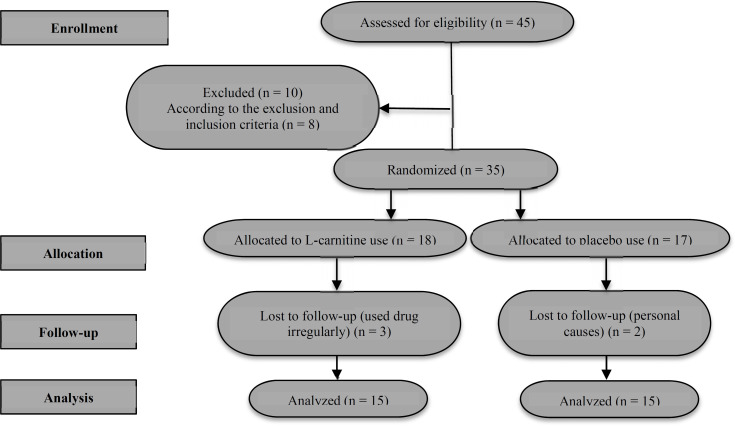Assessment of L-carnitine effectiveness on carpal tunnel syndrome.
IF 0.5
Q4 CLINICAL NEUROLOGY
引用次数: 1
Abstract
Background: Carpal tunnel syndrome (CTS) is the most prevalent entrapment neuropathy. Due to the results of recent studies about the protective effects of L-carnitine on nerves, this study was conducted to evaluate the effects L-carnitine on CTS improvement in terms of patient's function, electrodiagnostic study (EDX), and median nerve sonography. Methods: In this double-blind, randomized, controlled trial, patients with CTS were selected based on the inclusion and exclusion criteria, and then, divided into two groups of placebo and L-carnitine at a dose of 500 mg twice daily for 6 weeks. They were assessed at baseline, and 4 and 6 weeks later using Boston Carpal Tunnel Questionnaire (BCTQ), median nerve conduction study (EDX), and sonography. Results: There was no statistically significant difference between the intervention and control groups in terms of BCTQ scores, electrodiagnostic findings, and sonographic indexes. Although based on the results of the repeated measures test of the intervention and control groups separately, there was a statistically significant difference in some electrodiagnostic criteria and BCTQ scores. These indexes improved after the intervention. Conclusion: The effectiveness of L-carnitine on mild to moderate CTS improvement cannot be approve based on the findings of this study and more studies and systematic reviews are required in this regard.

左旋肉碱治疗腕管综合征的疗效评价
背景:腕管综合征(CTS)是最常见的卡压性神经病。鉴于最近关于L-肉碱对神经保护作用的研究结果,本研究旨在从患者功能、电诊断研究(EDX)和正中神经超声等方面评估L-肉碱对CTS改善的影响。方法:在这项双盲、随机、对照试验中,根据纳入和排除标准选择CTS患者,然后将其分为安慰剂组和左旋肉碱组,剂量为500mg,每日两次,为期6周。他们在基线时以及4周和6周后使用波士顿腕管问卷(BCTQ)进行评估, 正中神经传导研究(EDX)和超声检查。结果:干预组和对照组在BCTQ方面没有统计学上的显著差异 评分、电诊断结果和超声指标。尽管分别基于干预组和对照组的重复测量测试结果,但在一些电诊断标准和BCTQ方面存在统计学显著差异 得分。这些指标在干预后有所改善。结论:根据本研究的结果,不能批准L-肉碱对轻度至中度CTS改善的有效性,需要在这方面进行更多的研究和系统综述。
本文章由计算机程序翻译,如有差异,请以英文原文为准。
求助全文
约1分钟内获得全文
求助全文
来源期刊

Current Journal of Neurology
CLINICAL NEUROLOGY-
CiteScore
0.80
自引率
14.30%
发文量
30
审稿时长
12 weeks
 求助内容:
求助内容: 应助结果提醒方式:
应助结果提醒方式:


